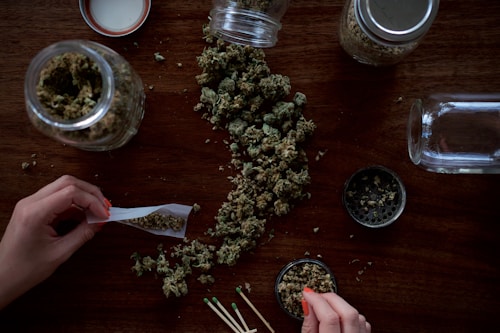Marijuana, commonly known as weed, has been a topic of significant interest and debate when it comes to its effects on anxiety. While some users find it beneficial for managing their anxiety, others experience increased anxiety and paranoia. This article delves into the complex relationship between weed and anxiety, exploring the roles of THC and CBD, individual differences, and considerations for safe use.

The Science Behind Marijuana and Anxiety
THC and Anxiety
THC (tetrahydrocannabinol) is the primary psychoactive compound in marijuana that produces the “high.” It binds to CB1 receptors in the brain, influencing mood and perception. Low doses of THC may help reduce anxiety, but higher doses are often associated with increased anxiety and paranoia, particularly in individuals with a predisposition to anxiety disorders. This dose-dependent effect is crucial to understanding how THC impacts anxiety levels (Addictions, Drug & Alcohol Institute) (Drexel Home).
CBD and Anxiety
CBD (cannabidiol), another major cannabinoid in marijuana, is non-psychoactive and has shown promise in reducing anxiety. Studies have indicated that CBD can alleviate anxiety without the psychoactive effects associated with THC. It interacts with serotonin receptors, which play a role in mood regulation. CBD’s anxiolytic properties make it a potential therapeutic option for anxiety, often used to counterbalance the effects of THC in some cannabis strains (Drexel Home) (University of Colorado Boulder).
Individual Differences in Response
The effects of marijuana on anxiety vary significantly from person to person, influenced by several factors:
- Genetics: Genetic variations can affect how individuals metabolize cannabinoids.
- Mental Health History: Those with pre-existing anxiety disorders may react differently to marijuana.
- Tolerance Levels: Regular users may develop a tolerance to THC, necessitating higher doses, which can increase anxiety risk.
- Strain and Dosage: Different strains and their THC/CBD ratios play a crucial role in their effects on anxiety (Drexel Home) (Yale School of Medicine).
Potential Benefits of Marijuana for Anxiety
Despite the risks, some individuals find marijuana helpful in managing anxiety. Potential benefits include:
- Relaxation and Stress Relief: Low doses of THC or balanced THC/CBD strains can promote relaxation.
- Improved Sleep: Marijuana may help improve sleep quality, indirectly reducing anxiety.
- Mood Enhancement: Appropriate strains and dosages can uplift mood and alleviate symptoms of anxiety and depression (Drexel Home) (University of Colorado Boulder).
Risks and Side Effects
Marijuana use carries potential risks and side effects, particularly concerning anxiety:
- Increased Anxiety and Paranoia: High doses of THC can exacerbate anxiety and paranoia.
- Dependence and Withdrawal: Regular use can lead to dependence, with withdrawal symptoms including anxiety and irritability.
- Cognitive Impairment: Chronic use can impair memory, attention, and cognitive function, potentially worsening anxiety (Yale School of Medicine) (University of Colorado Boulder).
Safe Use and Considerations
For those considering marijuana for anxiety relief, here are some tips for safe use:
- Start Low and Go Slow: Begin with a low dose and gradually increase to find the optimal dose that provides relief without causing anxiety.
- Choose the Right Strain: Opt for strains with higher CBD and lower THC content to minimize anxiety risk.
- Consult with a Healthcare Provider: Discuss marijuana use with a healthcare provider, particularly if you have a history of anxiety or other mental health conditions.
- Be Mindful of Setting and Environment: Use marijuana in a safe, comfortable environment to reduce anxiety and paranoia risks (Addictions, Drug & Alcohol Institute) (Drexel Home) (University of Colorado Boulder).
Understanding the effects of weed on anxiety levels involves recognizing the roles of THC and CBD, individual differences in response, and the importance of safe use. While marijuana can offer anxiety relief for some, it also carries risks, particularly at higher doses of THC. By approaching its use with caution and seeking guidance from healthcare professionals, individuals can make informed decisions about using marijuana to manage their anxiety.
For more detailed information, you can refer to the studies and resources provided by University of Washington, Drexel University, Yale School of Medicine, and University of Colorado Boulder.
Download StressBuddy
for Less Stress, Buddy
StressBuddy is free
